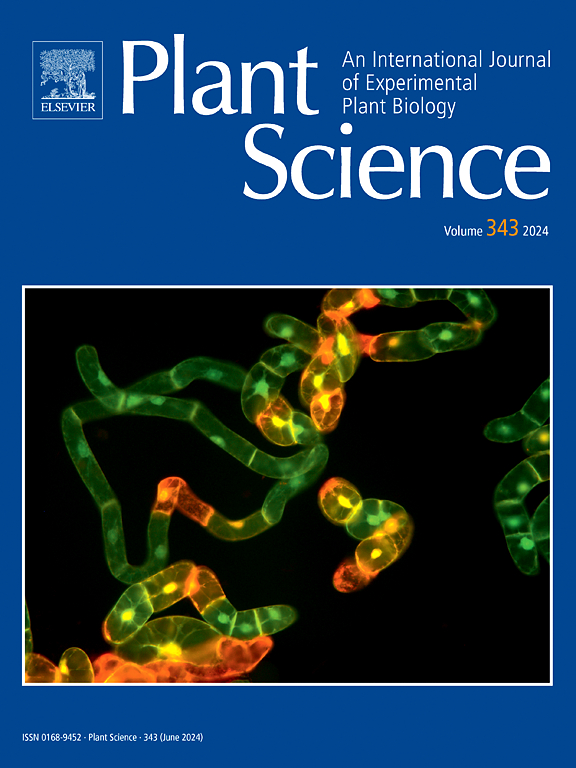The overexpression of DgPR1 enhances chrysanthemum cold tolerance through the ROS-mediated pathway
IF 4.2
2区 生物学
Q2 BIOCHEMISTRY & MOLECULAR BIOLOGY
引用次数: 0
Abstract
Cold stress affects the quality and yield of chrysanthemums and hinders the development of the chrysanthemum industry. PR-1, the first pathogenesis-related (PR) protein identified, is crucial in bolstering plant defenses by modulating responses to biotic and abiotic environmental pressures. Nevertheless, the precise contribution of PR-1 to chrysanthemum's resistance to cold stress is still not well defined. In the present study, a PR-1-like protein, DgPR1, was isolated from chrysanthemums. According to RT-qPCR analysis, DgPR1 expression was significantly elevated in the stems compared to the roots and leaves, with a notable upregulation observed under cold stress. Both CRISPR/Cas9-facilitated gene editing and overexpression of DgPR1 have demonstrated its beneficial effect on regulating cold-stress resistance in chrysanthemums. Overexpression of DgPR1 in transgenic chrysanthemums enhanced cold tolerance, as evidenced by increased survival rates, reduced symptoms of low-temperature injury, and levels of hydrogen peroxide (H2O2), malondialdehyde (MDA), superoxide anion (O2-) and relative electrolyte conductivity (REC). The ROS-scavenger enzyme-activity assay showed that DgPR1 enhanced peroxidase (POD) enzyme activity in chrysanthemums under cold stress. Additionally, the expression of DgPOD was higher in the overexpressing lines under cold stress compared to both the wild-type (WT) and the mutant dgpr1. Collectively, these findings indicate that DgPR1 contributes positively to improving cold stress tolerance in chrysanthemums.
过表达 DgPR1 可通过 ROS 介导的途径增强菊花的耐寒性。
冷胁迫会影响菊花的品质和产量,阻碍菊花产业的发展。PR-1 是第一个被发现的病原相关(PR)蛋白,它在通过调节对生物和非生物环境压力的反应来增强植物防御能力方面起着至关重要的作用。然而,PR-1 对菊花抵抗冷胁迫的确切贡献仍不十分明确。本研究从菊花中分离出一种类似 PR-1 的蛋白质 DgPR1。根据 RT-qPCR 分析,与根和叶相比,DgPR1 在茎中的表达明显升高,在冷胁迫下观察到明显的上调。CRISPR/Cas9 促进的基因编辑和 DgPR1 的过表达都证明了其对调节菊花抗寒性的有益作用。在转基因菊花中过表达 DgPR1 可增强菊花的耐寒性,具体表现为菊花的存活率提高,低温损伤症状减轻,过氧化氢(H2O2)、丙二醛(MDA)、超氧阴离子(O2-)和相对电导率(REC)水平降低。ROS 清除酶活性测定显示,DgPR1 能提高菊花在冷胁迫下的过氧化物酶(POD)活性。此外,与野生型(WT)和突变型 DgPR1 相比,过表达株系在冷胁迫下的 DgPOD 表达量更高。总之,这些研究结果表明,DgPR1 对提高菊花的冷胁迫耐受性有积极作用。
本文章由计算机程序翻译,如有差异,请以英文原文为准。
求助全文
约1分钟内获得全文
求助全文
来源期刊

Plant Science
生物-生化与分子生物学
CiteScore
9.10
自引率
1.90%
发文量
322
审稿时长
33 days
期刊介绍:
Plant Science will publish in the minimum of time, research manuscripts as well as commissioned reviews and commentaries recommended by its referees in all areas of experimental plant biology with emphasis in the broad areas of genomics, proteomics, biochemistry (including enzymology), physiology, cell biology, development, genetics, functional plant breeding, systems biology and the interaction of plants with the environment.
Manuscripts for full consideration should be written concisely and essentially as a final report. The main criterion for publication is that the manuscript must contain original and significant insights that lead to a better understanding of fundamental plant biology. Papers centering on plant cell culture should be of interest to a wide audience and methods employed result in a substantial improvement over existing established techniques and approaches. Methods papers are welcome only when the technique(s) described is novel or provides a major advancement of established protocols.
 求助内容:
求助内容: 应助结果提醒方式:
应助结果提醒方式:


